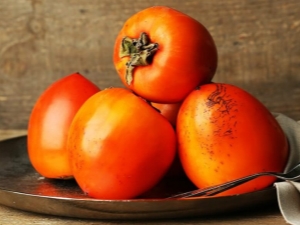The benefits and harms of persimmon for women

Already in the second half of autumn persimmon appears on the shelves of stores.This amazing fruit tastes admires the vitamin-mineral richness of the composition, but the persimmon bears the greatest benefit to the female body. What is the reason for this and how to maximize the use of this property of the fruit?
Composition and calorie
Persimmon boasts a rich vitamin-mineral composition and a high content of pectins, tannins. No wonder it is called the "female" berry - it contains all the components necessary for the woman’s body.
The berries of “Finnish plum” (namely, the name of the fruit is translated from Persian) contain vitamins A, groups B, PP, and also antioxidants - vitamins A and E. Micro and macro elements are represented by magnesium, potassium, iron, iodine, sodium, calcium , fiber.
There are also tannins useful for the intestines, organic acids and dietary fibers. Tannins, polyphenolic compounds and kakhetin enhance the benefits of the fruit.
- The nutritional value of the fruit is 62 kcal per 100 g of product.
- Carbohydrates account for 15.2 grams, proteins - 0.5 grams and a little less fats - 0.38 grams.
- A large amount of volume is water and fiber. The content of the last persimmon "overtook" apples.
Body benefits
Potassium and magnesium as part of a beneficial effect on the heart, providing a strengthening effect. Also, magnesium is involved in the synthesis of female hormones, and therefore is necessary for the functioning of the female reproductive system. His lack of provokes a failure of the menstrual cycle, problems with conception and carrying a child.
Potassium, in addition to benefits to the heart, has a decongestant effect. It is useful for women after 50 years - in the period of menopause, because it helps to stabilize the state of health, to reduce the individual manifestations of this process.
As part of persimmon is also available iron, which participates in blood formation, contributes to the saturation of the blood with oxygen, which is supplied to the organs and tissues. Regular consumption of persimmon - one of the ways to prevent anemia.
Antioxidants and Vitamin PP also have a beneficial effect on the vessels, increasing the elasticity of their walls, improving the permeability of capillaries. Due to the peculiarities of its composition, persimmon has a destructive effect on “bad” cholesterol. As a result, the risk of cholesterol plaque formation on the walls of blood vessels is reduced, which means that the likelihood of developing heart attacks and strokes and atherosclerosis is reduced.
This multi-seed berry is especially useful for women who suffer from heavy menstruation, because after menstruation there is a high probability that hemoglobin will decrease.
It is worth paying attention to the orange fruits and pregnant women, because at this time iron deficiency anemia often develops, which leads not only to the deterioration of the mother's condition, but also threatens with miscarriages, fetal hypoxia. Sweet-sour persimmon varieties also help to remove toxicosis in early pregnancy.
Vital for the body and iodine, which persimmon contains enough in large quantities. It is necessary for the thyroid gland and also provides the production of the necessary hormones in the required amount.
Rich ascorbic acid persimmon helps to strengthen the immune system. This, in turn, allows the body to better withstand colds and flu, negative manifestations of the external environment, beriberi. Persimmon can and should be included in the diet during the period of seasonal infections, used as a product that promotes faster recovery and recovery from past illnesses.
Besides, vitamin C improves calcium absorption. The latter, as is known, is necessary for the formation of a skeleton, strong teeth. Calcium is actively washed out of the body during pregnancy, lactation, as well as in old age, so the consumption of persimmon for women during these periods of life is especially useful.
In addition, vitamin C is an antioxidant that removes toxins from the body, binds radionuclides and slows down the aging process.Together with beta-carotene, which is characterized by an anti-oncological effect and a beneficial effect on the skin, ascorbic acid helps to preserve youth and beauty, to prevent a decrease in skin turgor.
However, the most powerful anti-aging component in this fruit is vitamin E. It reduces the intensity of age-related cell changes, saturates with healthy fats. Along with vitamin A, is involved in the production of female sex hormones, is responsible for the elasticity and sufficient amount of fat.
Thanks B vitamins in the composition of persimmon has a healing effect on the nervous system. Conductivity of nerve impulses is improved, signs of depression, chronic fatigue are removed, sleep is normalized. Berry provides a slight sedative effect, but does not inhibit the central nervous system. Because of this, as well as improving blood circulation, persimmon helps to improve performance, relieves stress and allows you to make a "reset" during intensive intellectual activity.
Contained in the composition tannins and dietary fiber help digestion. This fruit improves intestinal motility, which means that food is absorbed faster and better. Thus, it is possible to prevent the fermentation processes in the intestine, to get rid of the unpleasant feeling of heaviness, heartburn.
Without being digested, fiber comes out of the intestines, collecting toxins and toxins along the way. In other words, it acts like a brush or a panicle. If the intestine works correctly and in full force, then it contributes to the acceleration of metabolic and lipid (fat splitting) processes. It is not surprising that this product is used for weight loss.
Exist fasting days on the persimmon, when in addition to this fruit and mineral water other products are not taken as food. The effect of losing weight shows a decoction based on dried persimmon. A sweet, but low-calorie fruit can also replace more nutritious sweets, cakes and juices. In a word, his eating gives a feeling of fullness and allows the sweet teeth “not to break” during the diet.
Tannins They contribute to increased secretion of gastric juice, which also helps to better digest food, including heavy. The presence of pectin and fiber provides a mild laxative effect. Persimmon gently helps to cope with constipation, including in children and pregnant women.
However, if persimmon is abused, tannins and tannins in the composition will react with gastric juice and provide a strengthening effect on the intestines, in some cases contributing to the formation of fecal stones and provoking intestinal obstruction. Turns out that persimmon has an amazing property - it can and strengthen, and weaken. However, with moderate consumption, the main effect is still laxative.
In different varieties of persimmon, the content of a particular vitamin or trace element varies slightly. Thus, the Korolek variety is the record for vitamin A. These same fruits, by the way, are characterized by a lack of tartness, Korolek does not knit your mouth.
Large meaty persimmon variety "Bull's heart" affects not only the size and lack of seeds, but also a high content of iron and magnesium, tannins. It can be recommended for diseases of the cardiovascular system.
“Tangerine” fruits (such persimmon is externally similar to tangerine) contain ascorbic acid more than other varieties. In addition, they have a sweet taste.
During pregnancy, the recommended variety "Sharon", rich in beta-carotene. In addition, this species has the lowest nutritional value. However, sugars, not fructose, prevail in the composition, therefore, after eating “Sharon” the level of insulin in the blood rises sharply and significantly.
The high content of acids, tannins, vitamins and minerals allows the use of persimmon externally.In this case, it demonstrates anti-inflammatory, rejuvenating and wound-healing effects. She struggles with pigment spots, adding one or another additional ingredient, on the basis of persimmon, you can prepare masks for both dry and oily or problem skin.
On the basis of persimmon hair masks are also made that help to restore dried-up split ends, as well as after frequent dyeing and heat treatment (blow-drying, straightening, curling).
Harm to health
Consumption of persimmon should be abandoned if you are allergic to this fruit. Contraindications also apply to cases of inflammatory processes of the digestive tract. Exacerbation of gastritis, ulcers, pancreatitis, as well as intestinal infections, diarrhea - these are all diseases for which it is better to postpone the tasting of persimmon until a later date.
In chronic pancreatitis during remission, it is allowed to eat no more than 1 fetus without skin 2 times a week. Similar recommendations can be given for gastritis during remission. But with erosive gastritis and gastric ulcer from the consumption of fruit is better to completely give up. The ban on the consumption of fruit also extends in diseases of the urinary tract, adhesive disease.
Due to the high sugar content, persimmon is prohibited for diabetic patients, as well as in the severe stages of obesity. Its use in case of intestinal obstruction, tendency to diarrhea or severe constipation, as well as in the first weeks after the operation, will not be beneficial.
It is important to remember about the moderation of consumption of persimmon. Excessive eating it can cause nausea, vomiting, diarrhea, abdominal pain. With the continued abuse of the fetus possible intestinal obstruction.
A contraindication to the consumption of persimmon is also the age of children up to 3 years. Persimmon is a biologically active, concentrated fruit, so the baby's intestines in the process of development are not yet ready for such an "acquaintance". After 3 years of persimmon is better to give first in the form of compotes, jams, mashed potatoes with cottage cheese. In the absence of an allergic reaction, you can begin to introduce a small amount of fresh fruit into the diet.
As already mentioned, persimmon is useful during pregnancy. However, a woman “in position” should remember that during this period hormonal changes significantly, which can provoke allergic reactions even to familiar products. If, before pregnancy, you ate persimmon without negative consequences, then while waiting for the baby, you should also include it in your diet, albeit in smaller quantities.
If, even before pregnancy, the fetus had more unpleasant consequences than benefits (cases of non-digestion, skin rashes), then it should be definitely excluded from the menu when carrying a child.
The lactation period is not a reason to refuse persimmon, but it is allowed only in the absence of negative reactions from the child’s body. As a rule, due to the high sugar content in persimmon, it provokes diathesis in infants, and fiber - bloating and intestinal colic.
Usage features
In the absence of contraindications, the daily rate for an adult is 2-3 fetus per reception. No need to eat it daily, 2-3 times a week will be enough.
Consume only ripe fruit. As a rule, they have a transparent skin, a uniform color and darker stripes and blotches. The latter indicate the biological ripeness of the fruit and indicate their sweetness. The flesh should be moderately soft, but it does not turn into a mush immediately after a light touch.
Persimmon is better to consume in the morning. Firstly, it contains a lot of fiber, which puts a strain on the digestive organs. Secondly, an orange berry eaten on an empty stomach enhances appetite. For the same reason, do not eat the fruit as a snack, if you have problems with being overweight. This is due to the high content of sugar in the composition and, as a result, insulin spikes.
Persimmon can be added to salads, combined with poultry and meat. It is suitable for making jams, compotes, cocktails.
If you are baking or boiling persimmons, try to shorten the cooking time and lower the temperature of thermal exposure, because long-term boiling leads to the destruction of vitamins and trace elements, the accumulation of carcinogens in food.
It is possible not only to season with persimmon and to heal the body with persimmon, because frozen fruits retain all the beneficial properties. In addition, in the process of freezing tannin is destroyed. It is he who gives the fruit astringent properties, astringency, which means that they are absent in the frozen product. The shelf life of persimmon in the refrigerator is 6 months. Repeated freezing and thawing of fruits is unacceptable.
On the health benefits of persimmon, see the following video.









































